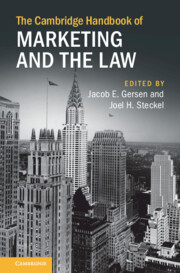Book contents
- The Cambridge Handbook of Marketing and the Law
- The Cambridge Handbook of Marketing and the Law
- Copyright page
- Dedication
- Contents
- Figures
- Tables
- Contributors
- Introduction
- Part I Understanding Consumer Behavior
- Part II Understanding Marketing Phenomena
- Part III Methodological Advances
- 9 Choice Experiments
- 10 Use of Conjoint Analysis in Litigation
- 11 Piece Problems
- 12 Marketing Analysis in Class Certification
- 13 Damages Estimation in Consumer Deception Class Actions
- 14 Taking a Second Look at Secondary Meaning
- 15 Social Media Evidence in Commercial Litigation
- Part IV How the Law Protects
15 - Social Media Evidence in Commercial Litigation
from Part III - Methodological Advances
Published online by Cambridge University Press: 29 June 2023
- The Cambridge Handbook of Marketing and the Law
- The Cambridge Handbook of Marketing and the Law
- Copyright page
- Dedication
- Contents
- Figures
- Tables
- Contributors
- Introduction
- Part I Understanding Consumer Behavior
- Part II Understanding Marketing Phenomena
- Part III Methodological Advances
- 9 Choice Experiments
- 10 Use of Conjoint Analysis in Litigation
- 11 Piece Problems
- 12 Marketing Analysis in Class Certification
- 13 Damages Estimation in Consumer Deception Class Actions
- 14 Taking a Second Look at Secondary Meaning
- 15 Social Media Evidence in Commercial Litigation
- Part IV How the Law Protects
Summary
This chapter demonstrates that analyzing what people post on social media sites can yield powerful evidence for use in commercial litigation. This kind of analysis is a natural way of listening in on people’s conversations about products, services, brands, trademarks, and patents, all of which are often the subject of high-stakes lawsuits. An argument is made that an expert who could commission an opinion survey could now also commission a social media analysis, which will contribute to a more persuasive and often more time-appropriate body of evidence upon which to rely. Examples of the use or potential use of social media in litigation are presented, including cases that used social media evidence, such as the US government’s lawsuit against Lance Armstrong; a case involving a meat byproduct sometimes referred to as “pink slime”; a case centering on an allegedly deceptive Super Bowl beer advertisement; and many cases involving disputes having to do with intellectual property. Finally, we compile and discuss a number of issues relating to the use of social media in litigation. These issues include questions about social media’s authenticity, the best way to preserve it, and several other analytical and legal questions. The chapter concludes with a discussion of how social media analysis can migrate from the periphery of litigation evidence toward having a more central role.
- Type
- Chapter
- Information
- The Cambridge Handbook of Marketing and the Law , pp. 312 - 344Publisher: Cambridge University PressPrint publication year: 2023

